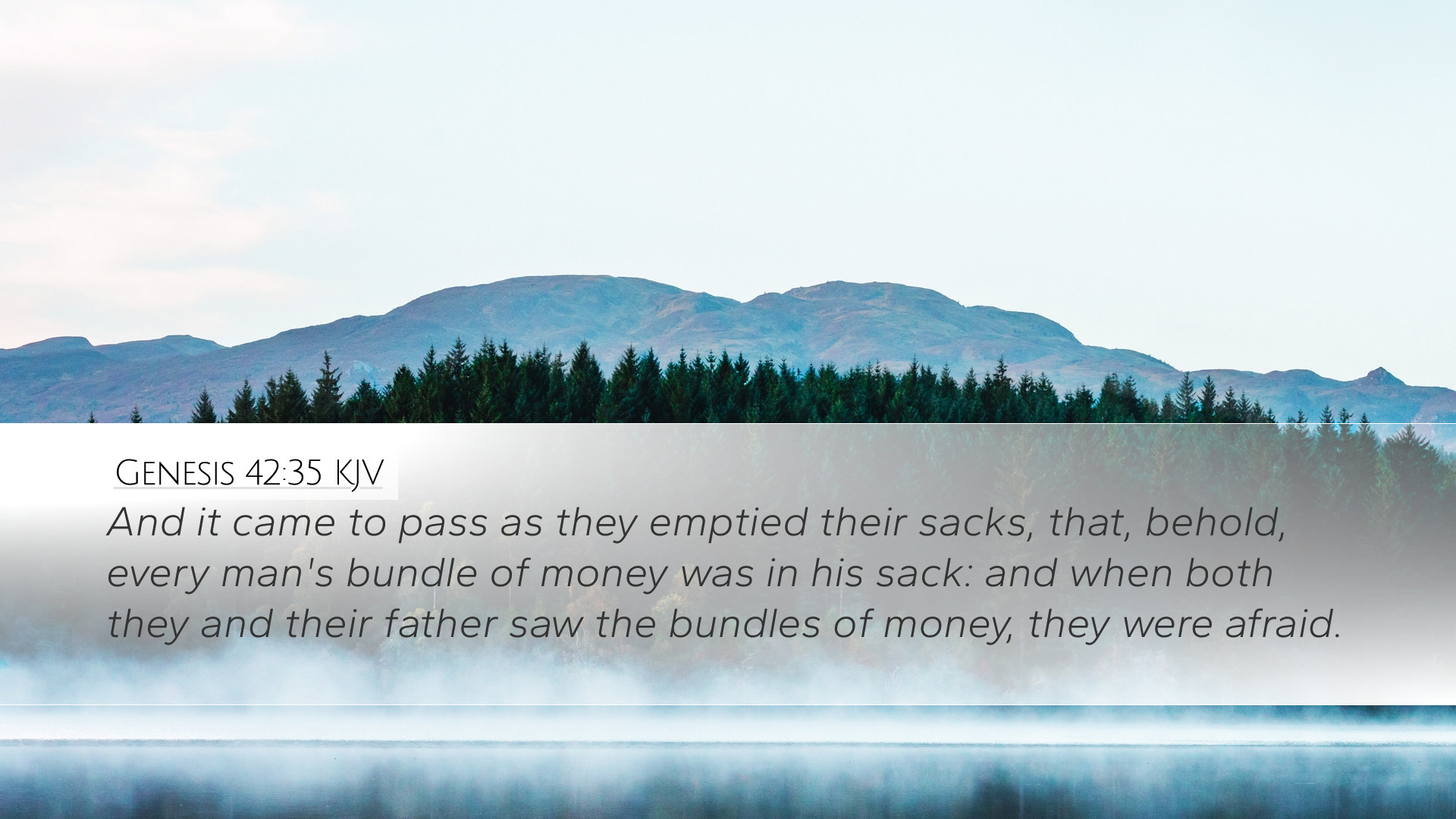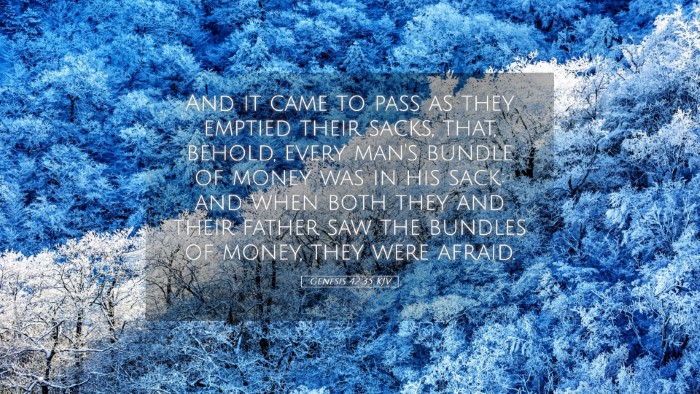Commentary on Genesis 42:35
This verse, Genesis 42:35, captures a pivotal moment in the narrative of Joseph and his brothers, revealing profound themes of guilt, family dynamics, and divine providence. As we explore this verse through the insights of renowned commentators such as Matthew Henry, Albert Barnes, and Adam Clarke, we will unpack its implications for contemporary readers, particularly pastors, students, theologians, and Bible scholars.
Contextual Overview
Genesis 42 narrates the story of Joseph's brothers coming to Egypt to buy grain during a famine. They encounter Joseph, who recognizes them despite their inability to identify him. In the unfolding drama, the brothers are accused of being spies, and they are detained. The verse in question, Genesis 42:35, occurs sequentially after they discover that their money has been returned in their sacks, which heightens their fear and guilt.
Verse Analysis
Genesis 42:35 states:
"And it came to pass as they emptied their sacks, that behold, every man’s bundle of money was in his sack: and when both they and their father saw the bundles of money, they were afraid."
Commentary Insights
1. Matthew Henry's Commentary
Matthew Henry emphasizes the emotional turmoil of the brothers upon discovering the money. He notes that their initial joy at having grain quickly turns to dread as they realize the implications of the returned money. Henry reflects on the theme of divine justice, pointing out how the brothers are confronted with their past actions against Joseph, generating fear and guilt.
- The Nature of Guilt: Henry suggests that guilt can resurface in unexpected ways, compelling individuals to re-evaluate their past mistakes.
- God's Providence: He asserts that these events are orchestrated by God to bring about a reconciliation among the family members and to lead them back to repentance.
2. Albert Barnes' Notes
Albert Barnes provides a more detailed analysis of the brothers’ reaction to the discovery of the money. He highlights how their fear signifies a recognition of the gravity of their situation. Barnes points out that the brothers are now placed in a position of vulnerability that provokes a more profound self-examination.
- Self-Reflection: Barnes interprets this moment as an opportunity for the brothers to reflect on their past sins, particularly their treatment of Joseph.
- The Unseen Hand of God: He emphasizes the idea that God is working behind the scenes, leading them towards a necessary confrontation with their wrongdoing.
3. Adam Clarke's Commentary
Adam Clarke examines the textual elements and cross-references within the narrative. He notes the significance of fear in the context of the brothers' discovery, suggesting that it is both a physical and spiritual reaction.
- Fear of Discovering the Truth: Clarke elaborates on how fear can be both a protective measure and an exposure of guilt. The brothers' fear signifies deep-seated anxiety over their past actions.
- Hope for Redemption: Clarke also indicates that amidst their fear, there is the potential for redemption and change, as they are compelled to reckon with their pasts.
Theological Implications
This verse invites readers to contemplate the nature of guilt and redemption. As the brothers face their fears, they symbolize the universal human condition of grappling with past sins. The returning of money serves as a divine reminder that God can use circumstances to lead individuals to repentance and restore relationships.
Practical Applications
For pastors and theologians, Genesis 42:35 offers a rich tapestry for preaching on themes of forgiveness and reconciliation:
- Encouraging Self-Examination: The verse prompts personal reflection—how do we confront our past choices, and what fears may we need to face?
- Promoting Reconciliation: The situation of Joseph and his brothers is a reminder of the importance of seeking forgiveness and restoring familial bonds.
- Highlighting Divine Providence: Every event in life, even those that invoke fear, can serve a purpose in God's plan for healing and redemption.
Conclusion
Genesis 42:35 serves as a poignant reminder of the complexities of human emotion, especially in the face of guilt and fear. By examining this verse through the lenses of well-respected commentators, we see it as more than just a historical account; it emerges as a timeless narrative encouraging believers to confront their fears, seek reconciliation, and trust in God's overarching plan for redemption.


